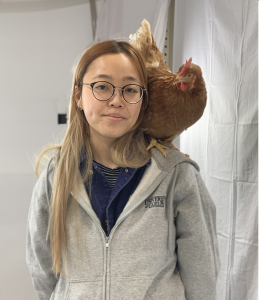 |
Grace HongPosition/Title: PhD Student email: hongg@uoguelph.ca Phone: Office: ANNU 043
|
I graduated from the University of Guelph with a B.sc, majoring in Animal Biology. Throughout my undergraduate career, I was able to learn about different aspects of the animal science world. I eventually found that my interests leaned more towards animal behaviour and welfare. In the past, I was able to work with a number of different animals ranging from companion to livestock animals via volunteering and different courses. As my undergraduate career came to a close, I realized that I wanted to further my learning through a M.Sc. (thesis). I gladly accepted the opportunity to work under the supervision of Dr. Alexandra Harlander. Although never working with poultry before, I was excited to expand my knowledge on welfare and behaviour and now my love for these birds has increased exponentially.
Current and Future Research
My research will be looking at connections between the pectoralis muscle and keel fractures along with the effects of feather loss on the predictive muscle force of the main flight muscles (pectoralis and supracoracoideus) of laying hens housed in aviary systems.
Feather loss in the laying hen industry is a common problem and can produce challenges for thermoregulation, protection of the skin, making quick escapes and accessing desirable resources. Through dissection, the pectoralis and supracoracoideus will be excised to calculate the physiological cross-sectional area and used to find the predictive muscle force for each muscle type. This project comes from a larger study conducted by Renee Garant with data on wing kinematics analyzed by Brianna León (https://doi.org/10.1098/rsos.210196).
Keel bone fractures are another prevalent problem in the laying hen industry. Therefore, my second project will focus on how exercise in the early life of poultry may play a protective role on keel bone health. From a young age, hens will participate in a cardio-based resistance exercise program, running up ramps at different angles to induce wing assisted incline running (WAIR). WAIR is a type of locomotion where the wings are used in conjunction with the hind limbs to accelerate the bird forwards. The effects of exercise on coordination will also be explored through this study.
The goal, along with other research produced by the Harlander Lab, is to further understand the source and causes of keel bone damage in laying hens. This research is increasingly important as many countries, including Canada, shifts from conventional cages towards alternative housing systems. If you are interested in the locomotion work conducted by the Harlander lab, please take a look at the other projects lead by my fellow labmates:
Education
B.Sc.H. (Animal Biology, University of Guelph, 2016-2020)
M.Sc. Thesis (Animal Bioscience, Animal Behaviour and Welfare, University of Guelph, 2020-Present)
- Supervisor: Dr. Alexandra Harlander
